粘着词根
100个常用英语词根

100个常用英语词根英语单词的构成方式有很多种,其中词根是最为基础的构词成分之一。
词根是指单词中最基础的词元素,具有不同的含义。
掌握常用英语词根十分重要,可以帮助我们快速准确的理解和记忆词汇,提高英语的阅读理解和写作能力。
下面就为大家介绍一些常用的英语词根。
1. act- 行动,做例如:actress (女演员), action (行动)2. ad- 向,朝例如:advance (前进), adhere (粘着)3. ambi- 两,双例如:ambidextrous (双手灵巧), ambiguous (模糊不清的)4. amphi- 两,双例如:amphibious (水陆两栖的), amphitheater (圆形露天剧场)5. ana- 再,重复例如:analysis (分析), anatomy (解剖)6. ante- 前,先例如:anterior (前面的), antecedent (先前的)7. anti- 反对,反抗例如:antibiotic (抗生素), anti-social (反社会的) 8. aqua- 水例如:aquarium (水族馆), aquamarine (海蓝宝石) 9. arch- 首例如:architect (建筑师), archbishop (大主教) 10. auto- 自己,自动例如:automatic (自动的), automobile (汽车) 11. bene- 仁慈,好例如:benefit (好处), benevolent (仁慈的)12. bio- 生命例如:biology (生物学), biography (传记)13. cardi- 心脏例如:cardiology (心脏病学), cardiogram (心电图) 14. cata- 下降,衰败例如:catastrophe (灾难), catalyst (催化剂)15. cede- 放弃,让步例如:concede (承认), secede (脱离)16. cent- 中心例如:centripetal (向心的), centimeter (厘米) 17. cerebr- 大脑例如:cerebral (大脑的), cerebrospinal (脑脊髓的) 18. chrom- 颜色例如:chromosome (染色体), chromatic (彩色的) 19. chron- 时间例如:chronology (年代学), chronic (慢性的) 20. cid- 杀,灭例如:homicide (杀人), insecticide (杀虫剂)21. circum- 环绕例如:circumference (周长), circumference (圆周) 22. co- 共同例如:cooperate (合作), coexist (共存)23. com- 一起例如:combine (结合), community (社区)24. contra- 相反例如:contradiction (矛盾), contraceptive (避孕的) 25. corp- 身体例如:corporation (公司), corpse (尸体)26. cosm- 宇宙例如:cosmic (宇宙的), cosmopolitan (世界性的) 27. crypto- 隐藏,秘密例如:cryptogram (密码), cryptic (神秘的) 28. cycl- 圆,周期例如:bicycle (自行车), cycle (周期)29. de- 向下,离开例如:decrease (减少), depart (离开)30. dec- 十例如:decade (十年), decimeter (十分米) 31. deca- 十例如:decathlon (十项全能), decagram (十克) 32. demo- 人民例如:democrat (民主党人), demotic (民间的) 33. dent- 牙齿例如:dentist (牙医), dental (牙科的)34. derm- 皮肤例如:dermatology (皮肤病学), dermatitis (皮炎) 35. dia- 通过,穿过例如:diameter (直径), diagonal (对角线)36. dic- 说例如:dictionary (词典), indicate (指示)37. di- 二例如:divisible (可分的), dioxide (二氧化物) 38. doc- 教育,教导例如:doctor (医生), document (文件)39. domin- 统治例如:dominate (支配), dominion (统治)40. don- 给予,赠送例如:donate (捐赠), pardon (宽恕)41. dub- 命名例如:dubious (可疑的), dub (配音)42. duc- 引导例如:produce (生产), introduce (介绍)43. dur- 持久例如:durable (持久的), endure (忍耐)44. dys- 不正常例如:dysfunctional (功能失调的), dyslexia (阅读障碍) 45. e- 电子例如:email (电子邮件), e-commerce (电子商务)46. eco- 环境例如:ecology (生态学), eco-friendly (环保的)47. ecto- 外部例如:ectoderm (外胚层), ectoplasm (外质)48. en- 使例如:enable (使能够), encourage (鼓励)49. end- 内部例如:endocrine (内分泌的), endoskeleton (内骨骼) 50. equi- 相等例如:equator (赤道), equidistant (等距离的)51. ex- 出,从例如:exit (出口), ex-boyfriend (前男友)52. extra- 在...之外例如:extraordinary (非凡的), extracurricular (课外的) 53. fac- 做,制造例如:factory (工厂), manufacture (制造)54. fid- 信任例如:confident (自信的), fidelity (忠诚)55. fin- 结束例如:finish (完成), final (最后的)56. fix- 固定例如:fixable (可固定的), fixture (装置)57. flam- 火焰例如:flamboyant (火焰般的), inflammation (炎症) 58. flex- 弯曲例如:flexible (灵活的), reflex (反射的)59. flu- 流动例如:fluid (流体), influence (影响)60. form- 形状例如:formation (形成), conform (遵循)61. fract- 打破例如:fracture (骨折), fracture-zone (断层带) 62. flect- 弯曲例如:reflect (反射), deflect (偏转)63. ger- 生产例如:germinate (发芽), generate (生产)64. geo- 地球,土地例如:geology (地质学), geography (地理学)65. gram- 记录,写例如:telegram (电报), grammar (语法)66. graph- 写,画例如:photography (摄影), autograph (亲笔签名) 67. hexa- 六例如:hexagonal (六边形的), hexapod (六足的) 68. hemo- 血液例如:hemoglobin (血红蛋白), hemophilia (血友病) 69. hetero- 不同的例如:heterogeneous (异质的), heterodox (异端的) 70. hex- 震动例如:hexagon (六边形), hexane (己烷)71. homo- 相同的例如:homogeneous (均质的), homosexual (同性恋的) 72. hydr- 水例如:hydraulic (水力的), hydrogen (氢)73. hyper- 超过,过度例如:hyperactive (活动过度的), hypertension (高血压) 74. hypo- 低于,不足例如:hypodermic (皮下的), hypotension (低血压) 75. icon- 图标例如:iconic (代表性的), iconoclast (打破旧习的人) 76. ign- 火例如:ignite (点火), ignition (点火)77. in- 不,非例如:incomplete (不完整的), invisible (不可见的) 78. inter- 在..之间,相互例如:interact (相互影响), intermission (间歇) 79. intra- 内部例如:intravenous (静脉内的), intrastate (州内的) 80. iso- 同等的例如:isometric (等距的), isosceles (等腰的)81. ject- 投掷例如:object (物体), reject (拒绝)82. jur- 法律,审判例如:jury (陪审团), jurisdiction (法律管辖权) 83. kilo- 千例如:kilometer (千米), kilogram (千克)84. lact- 乳汁例如:lactose (乳糖), lactate (乳酸盐)85. lat- 延长例如:latitude (纬度), lateral (侧边的)86. lex- 词语,字典例如:lexicographer (词典编撰者), lexical (词汇的) 87. leg- 法律例如:legal (合法的), legislature (立法机构)88. liber- 自由例如:liberation (解放), liberal (自由的)89. loc- 位置,地点例如:location (位置), local (本地的)90. log- 说话,理论例如:logic (逻辑), dialogue (对话)91. luc- 发光例如:lucid (清晰的), lucidite (光明)92. magn- 大的例如:magnify (放大), magnificent (壮丽的) 93. mal- 不好的例如:malfunction (功能失调), malign (恶意的) 94. mand- 命令例如:mandate (授权), command (命令)95. manu- 手工制作例如:manual (手工的), manufacture (制造) 96. mater- 母亲例如:maternal (母性的), maternity (产妇) 97. mega- 百万的例如:megabyte (兆字节), megawatt (兆瓦)98. meta- 超越,变化例如:metamorphosis (变形), metaphysics (形而上学)99. micro- 微小的例如:microscope (显微镜), microbe (微生物)100. migra- 迁移例如:migrate (迁移), emigrant (移民)以上就是100个常用的英语词根,涵盖了各个领域的词根。
粘着词根列表
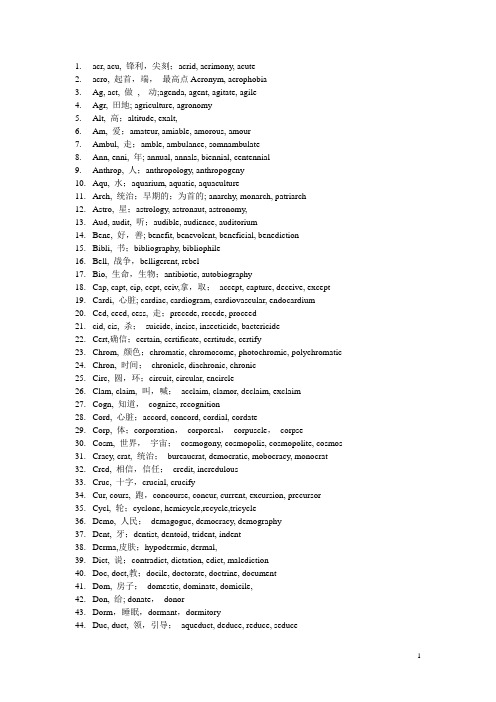
1.acr, acu, 锋利,尖刻;acrid, acrimony, acute2.acro, 起首,端,最高点Acronym, acrophobia3.Ag, act, 做, 动;agenda, agent, agitate, agile4.Agr, 田地; agriculture, agronomy5.Alt, 高;altitude, exalt,6.Am, 爱;amateur, amiable, amorous, amour7.Ambul, 走;amble, ambulance, somnambulate8.Ann, enni, 年; annual, annals, biennial, centennial9.Anthrop, 人;anthropology, anthropogeny10.Aqu, 水;aquarium, aquatic, aquaculture11.Arch, 统治;早期的;为首的; anarchy, monarch, patriarch12.Astro, 星;astrology, astronaut, astronomy,13.Aud, audit, 听;audible, audience, auditorium14.Bene, 好,善; benefit, benevolent, beneficial, benediction15.Bibli, 书;bibliography, bibliophile16.Bell, 战争,belligerent, rebel17.Bio, 生命,生物;antibiotic, autobiography18.Cap, capt, cip, cept, ceiv,拿,取;accept, capture, deceive, except19.Cardi, 心脏; cardiac, cardiogram, cardiovascular, endocardium20.Ced, ceed, cess, 走;precede, recede, proceed21.cid, cis, 杀;suicide, incise, insecticide, bactericide22.Cert,确信;certain, certificate, certitude, certify23.Chrom, 颜色;chromatic, chromosome, photochromic, polychromatic24.Chron, 时间;chronicle, diachronic, chronic25.Circ, 圆,环;circuit, circular, encircle26.Clam, claim, 叫,喊;acclaim, clamor, declaim, exclaim27.Cogn, 知道,cognize, recognition28.Cord, 心脏;accord, concord, cordial, cordate29.Corp, 体;corporation,corporeal,corpuscle,corpse30.Cosm, 世界,宇宙;cosmogony, cosmopolis, cosmopolite, cosmos31.Cracy, crat, 统治;bureaucrat, democratic, mobocracy, monocrat32.Cred, 相信,信任;credit, incredulous33.Cruc, 十字,crucial, crucify34.Cur, cours, 跑,concourse, concur, current, excursion, precursor35.Cycl, 轮;cyclone, hemicycle,recycle,tricycle36.Demo, 人民;demagogue, democracy, demography37.Dent, 牙;dentist, dentoid, trident, indent38.Derma,皮肤;hypodermic, dermal,39.Dict, 说;contradict, dictation, edict, malediction40.Doc, doct,教;docile, doctorate, doctrine, document41.Dom, 房子;domestic, dominate, domicile,42.Don, 给; donate,donor43.Dorm,睡眠,dormant,dormitory44.Duc, duct, 领,引导;aqueduct, deduce, reduce, seduce45.Ed, 吃,edacious, edible46.Equ, 平等,平均;equilibrium, equinox, equivalent, equivocal47.Ego, 自我;egoism, egocentric, egomania, ego-defense48.Fac, fact, fic, fect,做;facial, factitious49.Fer, 拿,带;confer, differ, offer, transfer50.Fid, 信任,信仰;confidant, confidence, diffidence, infidel51.Fin,末,边;confine, define, finish, finite52.Flect, flex, 弯曲;deflect, flexible, reflect53.Flict, 打击;afflict, affliction, conflict, inflict54.Flor, 花,effloresce, florist, flourish55.Flu, flux, 流; affluent, fluent, influence56.Fract, frag, frang, fring,破,折;fracture, fragile, fragment, infringe57.Fus, fund, found,流,溶confuse, diffuse, infuse, transfuse58.Gam, 婚姻,bigamy, endogamy59.Gen, 产生;generate, oxygen60.Gon, 角;pentagon, trigonometry61.Grad, gress, 走;aggression, degrade, digress, degress62.Gram, graph, 写,写得东西;diagram, orthography, photograph, program63.Grav, 重;aggravate, gravitation, gravid64.Gyn, gyneco, 妇女;gynecology, misogynist65.Habit, 居住;cohabit, habitat, inhabitant66.Hal, 呼吸;exhale, inhalator, inhale,halitosis67.Her,hes 粘着;adhere, cohere, hesitate, inhere68.Hospit,客人;hospitable, hostage, hotel69.Hydro, 水;hydroelectric, hydrographic70.Icon,像,图像;iconography,iconoclast71.Ign,火;ignite,iginition72.Integr, 完整;disintegrate, integral, integrate73.it ,走;exit, circuit, itinerate, transit74.jac, ject, 投;abject, eject, inject,reject75.junct, join,连接;adjunct, conjunction, joint, juncture76.juv, jun,年轻,少;junior, juvenile, rejuvenatet, 拿,带;ablate, collate, sublateter, 边;bilateral, equilateral, lateral79.leg, legis,法律;illegality, legislature80.lith, lite,石头;aerolite, zoolite81.loc, 置;collocate, locate, relocate82.log, 说;dialogue, eloquent, epilogue83.lun, 月亮;lunar, lunatic, semi-lunar84.man, manu, 手;manipulate, manufacture85.mar,海;marine, submarine, mariculture86.magn, 大;magnifier, magnify, magnate87.ment, 心,思,神;comment, dementia88.migr,移动;emigrate, migrate, transmigrate, immigrate89.mis, miso, 恨;misanthropy, misogamy90.miss, mit, 发,送;dismiss, emit, missile91.morph, 形;amorphous, metamorphosis92.mort, 死; immortal, postmortem93.mot, mov,移动;commotion, emotion94.mut, 变;commute, mutable, permute95.nasc, nat, 出生;connate, cognate, native96.nihil, 无;annihilate, nihilism97.nov,新;innovate, novel, novice, renovate98.onym, 名;antonym, homonym99.part, 分,离;apart, depart, impartial100.path, 感情;neuropathy, sympathy101.ped, pedo, 儿童,脚;pedagogy, pediatrics, biped, pedestrian102.pel, puls, 驱赶,推;compel, expel, propel, pulsate103.pend, pens, 悬,垂,付钱;depend, dispense, expend, pendent, perpend 104.phil, 爱;philanthropist, philosophy105.phobia, phobe, 恐惧;photophobia, pyrophobia106.phon,声音;symphony, stereophonic107.phys, 自然,身体;physics, physical108.pict, 画;depict, pictograph,pictorial109.pisc, 鱼;piscary, piscator110.plen, 满;plenary, replenish111.pon, posit, pound, pose, 放,置;compose, depose, deposit, impose 112.port, 拿,运;deport, export, portable, transport113.puir, quisit, quest,寻,问;acquire, conquest, inquire, request114.radic, 根;eradicte, radical, radicle115.rad, ras,擦;abrade, erase, raze, razor116.rap,rapt,抓; rape, rapture117.rect, reg, 正,直;correct, erect, rectify118.rod, ros, 咬;corrode, erode, rodent119.rupt,打断,爆发;bankrupt, erupt, interrupt120.rid, ris,笑;deride, derisive, ridicule121.scend, scens,爬,攀;ascend, descend, condescend, transcendental 122.scrib, script,写;describe, inscribe, postscript, prescrible123.sci, 知道;conscience, science, prescience124.sec, sequ 跟;consequence, persecute125.sect, 切;bisect, dissect, sectility126.sent, sens, 感觉;consent, resent, sensitive, sensory127.sed, sid, sess,坐,定居; preside, residence, sedate, subside128.simil, simul ,似,相同;assimilate, facsimile, simile, simultaneous 129.sist, 站;assist, exist, resist, persist130.son, 声音;resonant, sonic, soniferous131.somn, 睡眠;somnambulate, sonmniferous, insomnia132.spec, spect, spic,看;conspicuous, inspect133.spers,撒;散;disperse, intersperse134.spir, 呼吸;conspire, expire, inspire135.stell,星;stellar, stelliform136.struct,建;construct, instruct, destruction137.sume, 拿;assume, consume, presume138.tang, ting, tact,碰,接触;contact, contagion, intact, tangible139.ten, tin, tent, tain,持,握;contain, continue, detain, entertain, retain 140.tend, tens, tent,伸;extend, extent,intend141.terr,土地;extraterritorial, terrain, territory142.text, 织;context, intertexture,textile143.the, theo, 神,atheist, pantheist, theocracy, theologain144.therm, 热;diathermy, thermos, thermometer, thermodynamic145.tom, 切;anatomy, appendectomy146.tox, 毒;toxic, toxicology, intoxicate147.tract, 拉,拽;abstract, attract, contract148.umbr, 荫;umbrage, umbrella149.urb, 城市;exurb, suburb urban150.ut, 使用;utensil, utility, utilize, utilitarianism151.vac, van,空;vacancy, vacation, vaccuum152.vad, vas, 走;evade, invade, pervade, pervasive153.ven, vent, 来;adventure, convene, revenue, intervene154.vers, vert, 转;convert, divert, divorce, diversify, introvert, reverse, revert 155.vid, vis, 看见;evident, invisible, visa156.vit, viv,声明,生活;survive, revive, vital157.voc, vok, 声音,叫;advocate, evoke, provoke, vocalize158.volv, volut,转,滚,evolve, involve, revolve, volume159.vor, 吃;devour, herbivorous, voracious160.zoo, 动物,zoology, zoolite。
中考英语复习---常见英语词根以及其详细解释
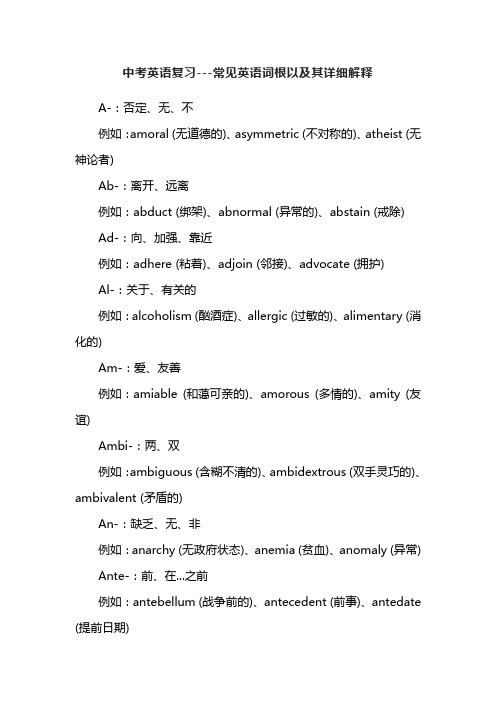
中考英语复习---常见英语词根以及其详细解释A-:否定、无、不例如:amoral (无道德的)、asymmetric (不对称的)、atheist (无神论者)Ab-:离开、远离例如:abduct (绑架)、abnormal (异常的)、abstain (戒除)Ad-:向、加强、靠近例如:adhere (粘着)、adjoin (邻接)、advocate (拥护)Al-:关于、有关的例如:alcoholism (酗酒症)、allergic (过敏的)、alimentary (消化的)Am-:爱、友善例如:amiable (和蔼可亲的)、amorous (多情的)、amity (友谊)Ambi-:两、双例如:ambiguous (含糊不清的)、ambidextrous (双手灵巧的)、ambivalent (矛盾的)An-:缺乏、无、非例如:anarchy (无政府状态)、anemia (贫血)、anomaly (异常) Ante-:前、在...之前例如:antebellum (战争前的)、antecedent (前事)、antedate (提前日期)Anthrop-:人类、人例如:anthropology (人类学)、anthropomorphic (拟人的)、misanthrope (厌恶人类者)Anti-:反对、相反例如:antibiotic (抗生素)、antidote (解毒剂)、antipathy (厌恶)Aqua-:水例如:aquarium (水族馆)、aquatic (水生的)、aquafer (含水层)Arch-:首要的、主要的、最高的例如:architect (建筑师)、archbishop (大主教)、archetype (原型)Auto-:自我、自动的例如:autobiography (自传)、automobile (汽车)、autonomous (自治的)Cad-:堕落、下降例如:cadaver (尸体)、cadence (节奏)、decadence (衰落) Celer-:快速例如:celerity (迅速)、accelerate (加速)、celeriac (根茎菜) Cide-:杀、杀死例如:homicide (杀人)、suicide (自杀)、pesticide (杀虫剂) Circum-:环绕、周围例如:circumference (周长)、circumnavigate (环球航行)、circumstance (环境)Cis-:在…这边例如:cisgender (与出生时分配的性别一致的人)、cisalpine (阿尔卑斯山脉以此侧的)、cisplatin (一种化学药物)Civ-:城市、市民例如:civilian (平民)、civility (礼貌)、civic (市政的)Clar-:明亮、清晰例如:clarify (澄清)、clarion (号角)、declare (声明)Clud-:关闭、封闭例如:exclude (排除)、include (包括)、occlude (闭塞)Cog-:思考、认知例如:cognition (认知)、cognitive (认知的)、cogitate (思考) Com-:共同、一起例如:combine (结合)、community (社区)、company (公司) Con-:共同、一起例如:converge (汇聚)、conjunction (连词)、conglomerate (聚集)Corp-:身体、肉体例如:corpus (文集)、corpulent (肥胖的)、corps (军队)Cosm-:宇宙、世界例如:cosmos (宇宙)、cosmopolitan (世界主义者)、cosmochemistry (宇宙化学)Counter-:反对、相反例如:counteract (抵消)、counterfeit (伪造)、counterpart (对应物)Cred-:相信、信任例如:credit (信用)、credence (相信)、credulous (轻信的)。
粘着词根——精选推荐
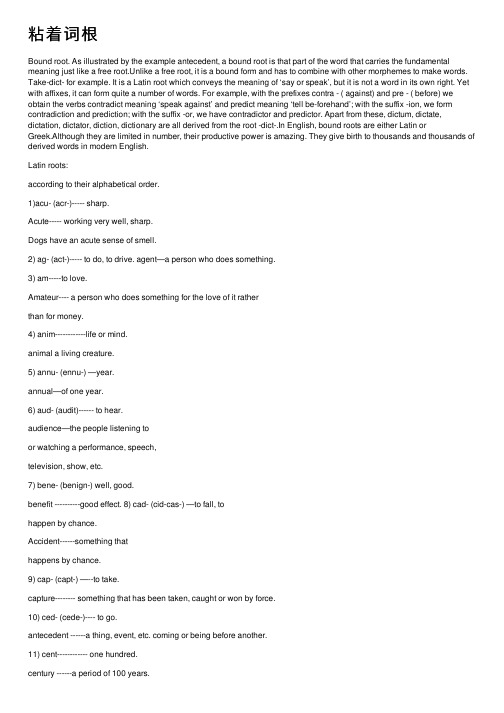
粘着词根Bound root. As illustrated by the example antecedent, a bound root is that part of the word that carries the fundamental meaning just like a free root.Unlike a free root, it is a bound form and has to combine with other morphemes to make words. Take-dict- for example. It is a Latin root which conveys the meaning of ‘say or speak’, but it is not a word in its own right. Yet with affixes, it can form quite a number of words. For example, with the prefixes contra - ( against) and pre - ( before) we obtain the verbs contradict meaning ‘speak against’ and predict meaning ‘tell be-forehand’; with the suffix -ion, we form contradiction and prediction; with the suffix -or, we have contradictor and predictor. Apart from these, dictum, dictate, dictation, dictator, diction, dictionary are all derived from the root -dict-.In English, bound roots are either Latin orGreek.Although they are limited in number, their productive power is amazing. They give birth to thousands and thousands of derived words in modern English.Latin roots:according to their alphabetical order.1)acu- (acr-)----- sharp.Acute----- working very well, sharp.Dogs have an acute sense of smell.2) ag- (act-)----- to do, to drive. agent—a person who does something.3) am-----to love.Amateur---- a person who does something for the love of it ratherthan for money.4) anim------------life or mind.animal a living creature.5) annu- (ennu-) —year.annual—of one year.6) aud- (audit)------ to hear.audience—the people listening toor watching a performance, speech,television, show, etc.7) bene- (benign-) well, good.benefit ----------good effect. 8) cad- (cid-cas-) —to fall, tohappen by chance.Accident------something thathappens by chance.9) cap- (capt-) —--to take.capture-------- something that has been taken, caught or won by force.10) ced- (cede-)---- to go.antecedent ------a thing, event, etc. coming or being before another.11) cent------------ one hundred.century ------a period of 100 years.12) cern- (cret-)------ to separate.secret—something separated orapart from others, something kepthidden or known only to a few. 13) clam- (claim-) to cry out.declaim—to say something loud andclear, with pauses and usually handmovements to Increase the effect ofthe words.14) dud- (clus) —to shut, to close.conclude to come to an end.15) cord—heart.Cordial----- warm and hearty. 16) corpor-. (corp-)------- body.Corpuscle----- any of the red or white cells in the blood.17) cre- (cresc-) —to grow.Increase------- to become larger in amount or number.18) cred-------to believe.Discredit------ to stop people believing.19) cumb- (cub--) to lie down.Cubicle-------- a very small enclosed room division of a larger room, as for dressing or undressing at a swimming pool.20) cur- (curs-, cours-) ---to run orto go.current -------a continuouslymoving mass of liquid or gas,especially one flowing throughslower-moving liquid or gas. 21) de- (div-)------- a god.divine—of, related to, or being God or a god.22) dict----- to say or to speak.dictate--------to say (words) for someone else to write down.23) doc- (doct-)------- to teach.doctor—It originally meant ‘a teacher’ , now it means ‘a person holding one of the highest degreesgiven by a university (such as a PhD,)24) duc- (duct-) —to lead.introduce----- t o make known forthe first time to each other orsomeone else, especially bytelling two people each other’snames.25)fac- (fic- fact-)----------- todo or to make.Manufacture---- to make or produce by machinery, especially in large quantities.26) fer------- to carry, to bring.c onfer —to give (a gift, title, honor, favor ,etc. ).27) firm-—firm, strong.Confirm---- to support, make certain, give proof of.28) flect- (flex-) -------to bend.Flexible------ that can bend or be bent easily.29) flu- (flux-)-------- a flow or to flow.Fluent------ speaking, writing, playing a musical instrument in an easily smooth manner.30) fus- (fund-)--------- to pour, to melt.confuse—to mix up, to make less clear.31) gam-------- marriage.bigamy ----the state of being married to two people at the same time.32) gen- (genit-)------ to produce,to give birth to.genesis—-the beginning ororigin.33) ger- (gest-)------- to carry.digest—---to change or to be changed into a form that the body can uses34) grad- (gress-)------ a step or to step or go.Gradual---- happening slowly and by degrees; not sudden.35) grat----------- pleasing.Congratulate------ to speak to a person with praise and admiration for a happy event or something successfully.36) gray-—heavy.gravity ------attractive force by which bodies tend to go to the center of earth, etc.37) her- (hes-)------- to stick.adhere.--------to stick firmly (to another or each other. )38) jac- (ject-) —to throw.project -----to cause (heat, sound,light, or shadow) to be directedinto space or onto a surface. 39) junct- (join (t) -)-----------to join.conjunction ------the act orresult of joining together, association.40) lect- (leg-, lig-)------- to choose.collect----- (to cause) to gather together.41) loqu- (lacut-)-------- to speak.Colloquial------ suitable for, related to ordinary informal, or familiar conversation.42) mit- (miss-) —to send, to letgo.Admit----- to permit (a person or thing) to enter.Missile--- a) an object or a weapon thrown by hand or shot from a gun or other instruments. b) an explosive weapon which can fly under its own power.43) mon- (monit-) —to warn, toadvise.Monitor---- a pupil chosen to help the teacher in various ways.44) nasc- (nat-) —to be born.Nation------ the place of one’s birth ,a large group of peopleliving in one area and usuallyhaving an independent govern-ment.45) pel- (pell-) —to drive.compel -------to make (a person or thing) do something by or as if by force.46) pend- (pens-) —to hang.depend ----to rely on.47) pet- (petit-) —to seek, tostrive.Competition----- a test of strength, skill, ability, etc.48) plex- (plic-, plicit—) —totwist, to connect. complexconsisting of many closelyrelated or connected parts. 49) pound- (pond- pose, posit-)——to put.compound -----consisting of two ormore separate parts, substances , etc.compose --------to make or form (something) by putting parts together.50) port-—to carry.Export---- to send (goods) out ofa country for a sale.51) quir- (quisit-) —to seek or ask.inquire—to ask.52) rupt------to break or to burst.interrupt ----to break the flow of (something continuous).53) scrib- (script-)------- to write.describe——- to give a picture (of someone or something) in words.54) sed- (sid-)------- to sit or to settle.preside -----to be in charge of, to lead.55) spect- (spec-, spic-) —to look,to look at.inspect ------to examine (the details of something).56) tact- (tang-, ting-)----- totouch.Contact--- to get in touch with (someone).57) ten- (tin-, tam-)-------- to hold.Continent---main unbroken masses of land on the earth.58) tract------ to drag or to pull.contract -----a formal agreement, having the force of law.59) ven- (vent-)------ t o move toward, to come.event ----a happening, usually an important one.60) vert- (vers-)------- to turn.reverse—to turn something, over, so as to show the back.61) vid- (vis-) ——--to see.Vision---- the ability to see. 62) voc- (vok-)-------- v oice or to call. Provoke----- to make (a person or animal) angry or bad tempered.63) volv (volut-) —to roll.Revolve----- to spin round (on a central point).Greek roots:1) anthrop-(anthropo-)--------- man or human.Anthropology----- the science ofman or the scientific study ofthe nature of man, including thedevelopment of his body, mind andsociety.2) archeo- (archi-)-------ancient.archeology—the study of theburied remains of ancient times,such as houses, pots, tools andweapons.3) aut- (auto-) ----self.Automatic----- able to work ormove by itselfwithout needing theoperation of men. - Questions and Tasks1. Write the terms in the blanks according to the definitions:a. a minimal meaningful unit of a language ( )b. o ne of the variants that realize a morpheme ( )c. a morpheme that occurs with atleast one other morpheme ( )d. a morpheme that can stand alone ( )e. a morpheme attached to a stem orroot ( )f.an affix that indicates grammatical relationships ( )g. an affix that forms new words with a stem or root ( )h.what remains of a word after the removal of all affixes ( )i. a form to which affixes of any kind can be added ( )2.Write out the common bound roots ofthe words in each of thefollowing groups and state theirmeanings.1) acoustic, acoustical, acoumeter,acoustician, acoustics,acouphone: _ acou- (tohear)_______2) amateur, amatory, amiable,amicable, amorous, enamoured,unamiable: _am-, amor-(love)________3) ample, ampleness, amply,amplidyne, amplification,amplifier, amplify, amplitude,radioamplifier: ampi- (enough) 4) annals , annual , perennial ,centennial, annuity, biennial:ann- (year)5) archangel, archbishop,arch-criminal ,archdeacon, arch-diocese, archenemy, archfiend: __5) arch- (chief, leader)_______6) biology, biogenesis, biogenic,biogeography, biography, bionics, bioscope, biotic, biomass: ___bio- (life)______________7) audible, audibility, inaudible,audience, audiology, audiovisual ,audiometer, audiophile, audition, auditor, auditorium: _aud- (to hear)_______ 8) autoalarm, autobiographer,autoboat , autobus, autochrome,autoclave, autocrat, autograph,autoinfection, automate,automatic, automation,automobile, autonomy, autotrunk,autotype: _ auto- (self)_______ 9) Bible, bibliofilm, bibliography,bibliology, bibliolater,bibliomania, bibliophile, bibliophilism, billiotheca, bibliotic, bibliotist: ___biblio-(book)______10) breve, breviary, brevirostrate, brevity, brief, abbreviate, abridges _bre- (brief)。
粘着词根列表
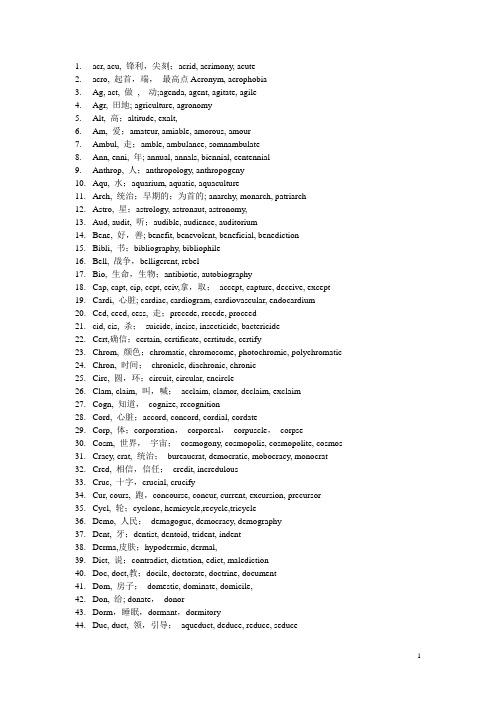
1.acr, acu, 锋利,尖刻;acrid, acrimony, acute2.acro, 起首,端,最高点Acronym, acrophobia3.Ag, act, 做, 动;agenda, agent, agitate, agile4.Agr, 田地; agriculture, agronomy5.Alt, 高;altitude, exalt,6.Am, 爱;amateur, amiable, amorous, amour7.Ambul, 走;amble, ambulance, somnambulate8.Ann, enni, 年; annual, annals, biennial, centennial9.Anthrop, 人;anthropology, anthropogeny10.Aqu, 水;aquarium, aquatic, aquaculture11.Arch, 统治;早期的;为首的; anarchy, monarch, patriarch12.Astro, 星;astrology, astronaut, astronomy,13.Aud, audit, 听;audible, audience, auditorium14.Bene, 好,善; benefit, benevolent, beneficial, benediction15.Bibli, 书;bibliography, bibliophile16.Bell, 战争,belligerent, rebel17.Bio, 生命,生物;antibiotic, autobiography18.Cap, capt, cip, cept, ceiv,拿,取;accept, capture, deceive, except19.Cardi, 心脏; cardiac, cardiogram, cardiovascular, endocardium20.Ced, ceed, cess, 走;precede, recede, proceed21.cid, cis, 杀;suicide, incise, insecticide, bactericide22.Cert,确信;certain, certificate, certitude, certify23.Chrom, 颜色;chromatic, chromosome, photochromic, polychromatic24.Chron, 时间;chronicle, diachronic, chronic25.Circ, 圆,环;circuit, circular, encircle26.Clam, claim, 叫,喊;acclaim, clamor, declaim, exclaim27.Cogn, 知道,cognize, recognition28.Cord, 心脏;accord, concord, cordial, cordate29.Corp, 体;corporation,corporeal,corpuscle,corpse30.Cosm, 世界,宇宙;cosmogony, cosmopolis, cosmopolite, cosmos31.Cracy, crat, 统治;bureaucrat, democratic, mobocracy, monocrat32.Cred, 相信,信任;credit, incredulous33.Cruc, 十字,crucial, crucify34.Cur, cours, 跑,concourse, concur, current, excursion, precursor35.Cycl, 轮;cyclone, hemicycle,recycle,tricycle36.Demo, 人民;demagogue, democracy, demography37.Dent, 牙;dentist, dentoid, trident, indent38.Derma,皮肤;hypodermic, dermal,39.Dict, 说;contradict, dictation, edict, malediction40.Doc, doct,教;docile, doctorate, doctrine, document41.Dom, 房子;domestic, dominate, domicile,42.Don, 给; donate,donor43.Dorm,睡眠,dormant,dormitory44.Duc, duct, 领,引导;aqueduct, deduce, reduce, seduce45.Ed, 吃,edacious, edible46.Equ, 平等,平均;equilibrium, equinox, equivalent, equivocal47.Ego, 自我;egoism, egocentric, egomania, ego-defense48.Fac, fact, fic, fect,做;facial, factitious49.Fer, 拿,带;confer, differ, offer, transfer50.Fid, 信任,信仰;confidant, confidence, diffidence, infidel51.Fin,末,边;confine, define, finish, finite52.Flect, flex, 弯曲;deflect, flexible, reflect53.Flict, 打击;afflict, affliction, conflict, inflict54.Flor, 花,effloresce, florist, flourish55.Flu, flux, 流; affluent, fluent, influence56.Fract, frag, frang, fring,破,折;fracture, fragile, fragment, infringe57.Fus, fund, found,流,溶confuse, diffuse, infuse, transfuse58.Gam, 婚姻,bigamy, endogamy59.Gen, 产生;generate, oxygen60.Gon, 角;pentagon, trigonometry61.Grad, gress, 走;aggression, degrade, digress, degress62.Gram, graph, 写,写得东西;diagram, orthography, photograph, program63.Grav, 重;aggravate, gravitation, gravid64.Gyn, gyneco, 妇女;gynecology, misogynist65.Habit, 居住;cohabit, habitat, inhabitant66.Hal, 呼吸;exhale, inhalator, inhale,halitosis67.Her,hes 粘着;adhere, cohere, hesitate, inhere68.Hospit,客人;hospitable, hostage, hotel69.Hydro, 水;hydroelectric, hydrographic70.Icon,像,图像;iconography,iconoclast71.Ign,火;ignite,iginition72.Integr, 完整;disintegrate, integral, integrate73.it ,走;exit, circuit, itinerate, transit74.jac, ject, 投;abject, eject, inject,reject75.junct, join,连接;adjunct, conjunction, joint, juncture76.juv, jun,年轻,少;junior, juvenile, rejuvenatet, 拿,带;ablate, collate, sublateter, 边;bilateral, equilateral, lateral79.leg, legis,法律;illegality, legislature80.lith, lite,石头;aerolite, zoolite81.loc, 置;collocate, locate, relocate82.log, 说;dialogue, eloquent, epilogue83.lun, 月亮;lunar, lunatic, semi-lunar84.man, manu, 手;manipulate, manufacture85.mar,海;marine, submarine, mariculture86.magn, 大;magnifier, magnify, magnate87.ment, 心,思,神;comment, dementia88.migr,移动;emigrate, migrate, transmigrate, immigrate89.mis, miso, 恨;misanthropy, misogamy90.miss, mit, 发,送;dismiss, emit, missile91.morph, 形;amorphous, metamorphosis92.mort, 死; immortal, postmortem93.mot, mov,移动;commotion, emotion94.mut, 变;commute, mutable, permute95.nasc, nat, 出生;connate, cognate, native96.nihil, 无;annihilate, nihilism97.nov,新;innovate, novel, novice, renovate98.onym, 名;antonym, homonym99.part, 分,离;apart, depart, impartial100.path, 感情;neuropathy, sympathy101.ped, pedo, 儿童,脚;pedagogy, pediatrics, biped, pedestrian102.pel, puls, 驱赶,推;compel, expel, propel, pulsate103.pend, pens, 悬,垂,付钱;depend, dispense, expend, pendent, perpend 104.phil, 爱;philanthropist, philosophy105.phobia, phobe, 恐惧;photophobia, pyrophobia106.phon,声音;symphony, stereophonic107.phys, 自然,身体;physics, physical108.pict, 画;depict, pictograph,pictorial109.pisc, 鱼;piscary, piscator110.plen, 满;plenary, replenish111.pon, posit, pound, pose, 放,置;compose, depose, deposit, impose 112.port, 拿,运;deport, export, portable, transport113.puir, quisit, quest,寻,问;acquire, conquest, inquire, request114.radic, 根;eradicte, radical, radicle115.rad, ras,擦;abrade, erase, raze, razor116.rap,rapt,抓; rape, rapture117.rect, reg, 正,直;correct, erect, rectify118.rod, ros, 咬;corrode, erode, rodent119.rupt,打断,爆发;bankrupt, erupt, interrupt120.rid, ris,笑;deride, derisive, ridicule121.scend, scens,爬,攀;ascend, descend, condescend, transcendental 122.scrib, script,写;describe, inscribe, postscript, prescrible123.sci, 知道;conscience, science, prescience124.sec, sequ 跟;consequence, persecute125.sect, 切;bisect, dissect, sectility126.sent, sens, 感觉;consent, resent, sensitive, sensory127.sed, sid, sess,坐,定居; preside, residence, sedate, subside128.simil, simul ,似,相同;assimilate, facsimile, simile, simultaneous 129.sist, 站;assist, exist, resist, persist130.son, 声音;resonant, sonic, soniferous131.somn, 睡眠;somnambulate, sonmniferous, insomnia132.spec, spect, spic,看;conspicuous, inspect133.spers,撒;散;disperse, intersperse134.spir, 呼吸;conspire, expire, inspire135.stell,星;stellar, stelliform136.struct,建;construct, instruct, destruction137.sume, 拿;assume, consume, presume138.tang, ting, tact,碰,接触;contact, contagion, intact, tangible139.ten, tin, tent, tain,持,握;contain, continue, detain, entertain, retain 140.tend, tens, tent,伸;extend, extent,intend141.terr,土地;extraterritorial, terrain, territory142.text, 织;context, intertexture,textile143.the, theo, 神,atheist, pantheist, theocracy, theologain144.therm, 热;diathermy, thermos, thermometer, thermodynamic145.tom, 切;anatomy, appendectomy146.tox, 毒;toxic, toxicology, intoxicate147.tract, 拉,拽;abstract, attract, contract148.umbr, 荫;umbrage, umbrella149.urb, 城市;exurb, suburb urban150.ut, 使用;utensil, utility, utilize, utilitarianism151.vac, van,空;vacancy, vacation, vaccuum152.vad, vas, 走;evade, invade, pervade, pervasive153.ven, vent, 来;adventure, convene, revenue, intervene154.vers, vert, 转;convert, divert, divorce, diversify, introvert, reverse, revert 155.vid, vis, 看见;evident, invisible, visa156.vit, viv,声明,生活;survive, revive, vital157.voc, vok, 声音,叫;advocate, evoke, provoke, vocalize158.volv, volut,转,滚,evolve, involve, revolve, volume159.vor, 吃;devour, herbivorous, voracious160.zoo, 动物,zoology, zoolite。
浅谈英语单词的词根、词干和词基

2008年《和田师范专科学校学报》(汉文综合版)Jul.2008第28卷第三期总第53期浅谈英语单词的词根、词干和词基张荣花史宝辉(北京林业大学外语学院北京100036)[摘要]谈到英语词的构成时,经常提及曲折变化和派生。
因此也无一种词的形式)14J 可避免的要涉及到与其相关的词根、词干和词基.但是人们经常分不清这三个概以上各定义对于词根的解释基本上可以取得一致意见,词根是幺,甚至有些语言学家摈弃使用词基或者根本就不区分词干和词基。
基于此,笔形态学上最小的语义结构:对于词干的解释Plag和《语言学教程》者针对这三个概念的特点讨论它们之间的异同及其各自特点.中认为它只和曲折变化相关,Ba uer和M athe ws对它的定义则较为[关键词]词根;词干;词基广泛;对于词基的理解也比较有争议,有的语言学家认为它的含义在英语语言分析中,很多语言学家都解释了词以及词的构成,很广泛,有的就彻底把它抛弃不用了。
为进一步阐述各概念内涵与以便人们能够更好的理解词的形成和演变过程。
在分析词的结构时,外延及其特点,现分述如下:引入了词根、词干和词基等形态学常用的概念。
但是很多人对这些2.词根概念并不清晰,当谈到什么是词根,什么是词干,什么是词基以及从以上定义中我们可以看出,语义学上来说词根含有这个词的它们之间有什么区别的时候,会感到非常迷惑。
本文旨在帮助读者中心意义;形态学上来说它是一种不能再分的单位。
因此,词根常全面理解词根、词干和词基的概念及其特点,同时也帮助大家理解用于清晰的解释词不可分割的一部分。
例如;international。
当去掉什么是曲折变化和派生变化以及曲折词缀和派生词缀。
后缀al和前缀inter,就剩下词根nation了,nation不能再分为na and 1.关于词根、词干和词基的不同定义tion,如果这样再分,就破坏了这个词本身的含义。
不同的语言学家对这三个概念有着不同的界定,以下仅列出一词根也是词素,词素有自由词素和粘着词素,那么同样词根也部分:有自由词根和粘着词根。
英语字典的结构专属单词本

英语字典的结构专属单词本英语单词的结构第二次世界大战以来,现代英语发生了较大的、较快的变化,这种变化最明显地表现在词汇方面。
新词和语法主要是利用语言现有的材料通过构词方式产生的。
一、英语单词的结构研究单词的构词方式应当首先从分析单词的结构入手。
词是能独立运用的、最小的、有语义的语言单位。
根据其句法功能,词可分为功能词(function word)和定义词(content word)两类。
功能词指的是没有完整词汇意义但有语法意义或语法功能的词,包括限定词(determinate)、代词(pronoun)、介词(preposition)、连接词(conjunction)、助词(auxiliary verb)、感叹词(interjection)等。
定义词指的是本身有完整的词汇意义的词,包括名词(noun)、动词(verb)、形容词(adjective)、副词(adverb)等。
英语单词是由字母拼写而成的,可以由一个字母组成一个单词,例如I (pron,我);也可以由45字母组成一个单词,例如:pueumonoultramicroscopicsilicovolcanoconiosis,这个词可译为“肺火山超微硅粉沉着症”。
但是这不是英语中最长的词,下面这个词由58个字母组成:diisobutylphenoxyethoxyethylbenzylammoniumchloride,这个词我们可译为“二-异丁基、酚氧乙基、二由基苄基氯化铵”。
这个巨型单词,如果没有一个有效的记忆方法是很难让人掌握的,所以,我们要了解英语单词的内部结构。
1.词素(morpheme)词素是词的组成部分,是语言中语音和语义的最小结合体,它可分为词根和词缀。
词根是词的核心部分,是体现词的词汇意义的词素。
可以单独成词的词根叫自由词根,如bed,band,see,look等。
不可以单独成词的叫粘着词根,它粘着于词根的词素叫词缀,其只构成词汇意义的次要组成部分,又可分为屈折词缀和派生词缀。
stic词根词缀

stic词根词缀全文共四篇示例,供读者参考第一篇示例:stic是一个常用的词根,意为“站立”或“使固定”。
它常用于构成许多英语单词中,增加了这些单词的丰富性和表达力。
在英语中,stic这一词根的变体主要有static、stabilize、instinct等。
让我们来看看static这个单词。
它是由stic词根和前缀sta-构成的。
static的基本含义是“静止的”或“不变的”。
这个词经常用于物理学和工程领域,用来描述不动的物体或状态。
我们常说“static electricity”(静电)或“static pressure”(静压力),都是指保持不变或固定的状态。
static也可以用来形容人或事物缺乏变化或活力,比如“a static life”(乏味的生活)或“a static economy”(停滞的经济)。
另一个常用的单词是stabilize,它是由stic词根和后缀-ize构成的,意为“使稳定”或“使固定”。
我们经常听到“stabilize prices”(稳定价格)或“stabilize the situation”(稳定局势)这样的用法。
通过在stic词根后添加-ize后缀,我们可以构建出形容词stabilizing,表示“稳定的”或“固定的”,例如“stabilizing influence”(稳定作用)或“stabilizing force”(固定力)。
除了这两个单词外,stic词根还出现在instinct这个单词中。
instinct由stic词根和前缀in-构成,意为“本能”或“直觉”。
我们常说“animal instincts”(动物本能)或“follow one's instincts”(跟随直觉)。
instinct这个词强调的是不经过思考或学习就能够自然而然地做出某种行为或决定的本能能力。
在生物学和心理学领域,instinct也被用来描述动物和人类行为的天生本能。
英文常用词根汇总

以下我们主要介绍一些常用的词缀和粘着词根,看一下它们通常是如何构词表义的。
当然对大部分不常用的以及语音不独立的词缀和粘着词根来说,其表义特点要复杂得多,不过我们一般还可以把它们的构成词当作退化了的单纯词来看待,用基础构词法的方式来理解。
学习缀合法时要注意以下三点:词缀加在什么词性的词根或词上,词缀与词根或词之间的结构关系,缀合词的词性和词义特点。
(一)常用的后缀。
1、名词性后缀。
⑴动词加缀变为名词-er/-or.语音形式为Fer。
同于原结构不变,可以为偏正结构或连动结构,指“…者”,-er用来指人,-or用来指事物。
如,manager[5mAnIdV[]n.控制(mana)而运行事物的人(ger)——经理;commander[k[5mB:nd[]n.发令(comman)者(der)——指挥官。
-ment.语音形式独立。
①动补结构表结果,“…造成的”,一般指抽象的概念;②偏正结构,“…作用的行为或方式”或“…状态的行为”;③偏正结构,“…作用的行为者”,多指群体或工具。
本词缀更强调作用而且是好的作用。
如,government[5gQv[m[nt]n.运行事物的(govern)组织(ment)——政府,或运行事物的(govern)行为或方式(ment)——统治或统治方式,或运行事物(govern)造成的(ment)——统治状况;development[dI5vel[pm[nt]n.发展的(develop)行为(ment)——发展,或发展(develop)造成的(ment)——发育或新的发展。
-(t)ion.还有-sion 和-ation 的形式。
语音形式为tion或Fation一体。
①偏正结构,“…的行为或过程”;②动补结构表结果,“…形成或抓住的”。
如,collection[k[5lekF[n]n.收集事物的(collec)行为或过程(tion),或收集事物(collec)形成的或抓住的(tion)——收集品;decision[dI5saiF[n](decide)n.判断的(deci)行为或过程(sion),或判断(deci)形成的(sion)——决定。
词根-快乐12-动作词根12:粘附,接触
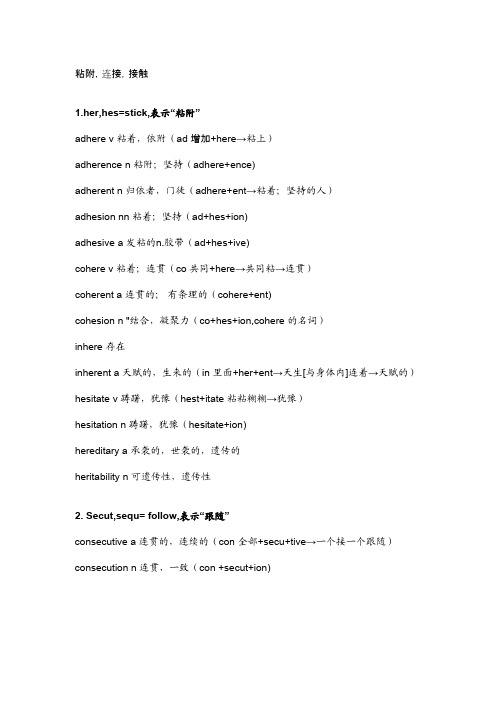
粘附,连接,接触1.her,hes=stick,表示“粘附”adhere v 粘着,依附(ad 增加+here→粘上)adherence n 粘附;坚持(adhere+ence)adherent n 归依者,门徒(adhere+ent→粘着;坚持的人)adhesion nn 粘着;坚持(ad+hes+ion)adhesive a 发粘的n.胶带(ad+hes+ive)cohere v 粘着;连贯(co 共同+here→共同粘→连贯)coherent a 连贯的;有条理的(cohere+ent)cohesion n "结合,凝聚力(co+hes+ion,cohere 的名词)inhere 存在inherent a 天赋的,生来的(in 里面+her+ent→天生[与身体内]连着→天赋的)hesitate v 踌躇,犹豫(hest+itate 粘粘糊糊→犹豫)hesitation n 踌躇,犹豫(hesitate+ion)hereditary a 承袭的,世袭的,遗传的heritability n 可遗传性,遗传性2. Secut,sequ= follow,表示“跟随”consecutive a 连贯的,连续的(con 全部+secu+tive→一个接一个跟随)consecution n 连贯,一致(con +secut+ion)persecute v 迫害(per 始终+secute→从头跟到尾→迫害)persecution n 迫害(per+secut+ion)prosecute v 控告,起诉(pro 在前+secute→跟随到[法官]前面→控告)prosecution 控告,起诉,检举,实施,执行,贯彻consequence n 后果,结果(con共同+sequ+ence→随之而来的全部东西)sequence n连续(sequ+ence→跟随→连续)sequential a 连续的(sequ+ent+ial)subsequence n 随后发生(sub 在后面+sequ+ence→随在后面的)sequacious a 盲从的(sequ+acious 多…的→跟随太多→盲的)sequacity n 盲从(sequ+acity)obsequious a 谄媚的,奉承的(ob用力+sequ+ious→拼命跟随别人→谄媚的)pursue v 追赶;追击sue v 控告;向…求婚3.junct,join=join,表示“结合,连接”junction n 接合,交汇点( junct+ion)juncture n 接合,连接(junct+ure)adjunct a 附属的,n 附属物;助手(ad 增加+junct→加上连接)conjunct a 结合的,共同的,n 结合体conjunction n 结合;连接词(con 共同+junct+ion→共同连上→结合)conjuncture n(事情同时发生的)关头,危机时刻(所有事连到一起的时刻)disjunct a分离的,不相连的disjunction n 分离;折断(dis 分开+junction→连接分开→分离)injunct v 命令,吩咐,下令制止injunction n 命令,禁止(in 不+junction→不让连接→禁止令)subjunctive n 虚拟语气的(sub 在下面→下面[似乎]连着→不肯定→虚拟的)joint n 关节;连接adjoin v 毗连,接壤(ad 一再+join→一再连上→毗连)adjoining a 毗邻的(adjoin+ing)disjoin v 分开,拆散(dis 分开+join→连接分开)disjointed a 脱节的;散乱的(disjoint+ed→分开的→脱节的)enjoin v 命令,吩咐(en 进入+join→进入连接→命令人[加入])rejoin v 再结合,重聚(re 再+join→再连接)rejoinder n 回答,答辩(re 反+join+der→反过来接→回答)subjoin v (在末尾)添加,增补(sub 在下面+join→在下面接上→增补)4. Nect,nex= bind, 表示“连结”nexus n 连结(nex+us)annex v 附加n. 附件(an 增加+nex→加上连结→附加)connexion n 连结;亲戚(con 共同+nex+ion→共同连结→亲戚关系)disconnect v 拆开,分离(dis 分开+connect 连结)5.tact,tag,tig,ting = touch 表示“接触”tactility a 触觉(tact+ility)tactual a 触觉的(tact+ual)tactile 触觉的,知觉的,有形的intact a 未触动的;完整的(in 没有+tact)tact n 机智;圆滑(和人接触的能力)tactics n 战术;策略(tact+ics 学问→接触(别人)的学问→策略)contact n 接触;联系(con 共同+tact→共同接触)contagion a 传染,感染(con 共同+tag+ion→共同接触到→传染)contagious a 传染的(con+tag+ious)contiguous a 邻近的,接近的(con 共同+tig+uous 互相接触→毗邻的)contingent a 依条件而定的(con共同+ting→(根据)大家接触到的情况而定)contingency a 偶然;意外事故(con+ting+ency→两件事接触→两车相撞)tangible a 能触知的(tang+ible 能接触的)intangible a 不能触知的(in 不+tangible)6. Pass=pass through,表示“通过”impasse n 死路;僵局,绝境(im 不+passe→通不过→死路)impassable a 不可通行的(im 不+pass+able)surpass v 优于,胜过(sur 超过+pass→通过并超过→胜过)trespass v 侵入,打扰(tres[=trans横过去]+pass→横穿而过→侵入[别人领地])compass n 范围,界限(com 共同+pass→共同能过的地方→做事的范围)encompass v 包围,环绕(en 进入+compass 范围→进入范围→包围)。
粘着名词解释

粘着名词解释
“粘着”是一个语言学术语,主要出现在词法学中。
它描述的是一种语言现象,其中一个词素(语言中最小的有意义的语言单位)不能独立出现,而必须附着在其他词素上。
换句话说,粘着词素是那些不能单独成词,必须依附于其他词素以获得意义的词素。
例如,在英语中,“-ness”是一个典型的粘着词素,它必须附着在基础词
上(如“happiness”中的“-ness”附着在“happy”上)以形成合法的
单词。
同样地,在法语中,“-tion”也是一个粘着词素,通常出现在以“-er”结尾的动词后,如“révolution”。
粘着词素与自由词素相对。
自由词素可以独立成词,例如“cat”、“dog”等。
以上内容仅供参考,建议查阅语言学相关书籍获取更全面和准确的信息。
词根词缀第一弹:hes

词根词缀第一弹:hes今天给大家讲个词根hes-,her-, 这两个词根都表示一个共同的意思:“粘”和“黏”。
这篇文章分为两个部分:第一部分是“词根助记”,主要帮助各位记忆词根,保证大家看完这个词根助记可以立马记住词根;第二部分是“单词扩展”,主要包括这个词根下面的单词。
#词根助记# her-, hes-her-,hes- 这两个词根是源于古代人对男人和女人的认知:女人离不开男人。
你观察一下我下面理解的几个单词:man/woman; he/she/her; male/female. 有没有发现这几组单词的特点?对,是每一个表示女性的单词里面都有一个男性出现。
女性离不开男性。
这就是因为古代要狩猎维持生活,男人由于先天的特点使得在这方面更优秀一点,所以一般都是女人依附男人。
你看在荒野生存里的都是男性占主导地位。
你可以看看一些一荒野生存为主题的电视剧或者电影,基本都是这样。
任何都事物都是源于生活,这两个词根也不例外。
所以在创造这两个词根的时候把女性she里的s拿到前面创造了一个词根hes-,把her直接拿过来创造一个词根her-, 女性离不开男性,引申意为“粘”和“黏”。
#单词扩展#1,adhere v. 粘,依附。
ad(加强语气) her(粘) e2, adherence n. 粘附,坚持ad(加强语气) her(粘) ence (名词后缀)3,adherent n, 门徒,皈依者ad(加强语气)her(粘)ent(在这是名词后缀表示人,想一下parent)4, adhesion n, 粘着,坚持ad(加强语气) hes(粘) ion(mincing后缀)5,adhesive adj. 发粘的ad(加强语气) hes(粘) ive(形容词后缀---想一下expensive)n. 胶带ad (加强语气) hes(粘) ive( 名词后缀-- 想一下detective侦探 ) 6, cohere v. 粘着,连贯co(com-全部) her(粘) e7,coherent。
自己总结的常用英语词根词缀

单词部分:1.复合词如果后缀是r双写时可以写作l或n,因为r,l,n这三个字母是一个系统内的,如alternative:二选一的,可供选择的,取舍。
2.al前缀是指“全部的”,也指“外”如alien.3.ut和ot前缀是out的缩写(两个元音字母保留一个即可)如utmost:最远的,极度的;n,极限最大可能。
Utter,说,发出声音;a,彻底的、完全的。
4.中国人思考文字最大的特点是用形象来思考文字,西文中最大特征是通过声音来描述文字。
所以学习英文是要通过发音来归类进行联想记忆.比如en、el、er的名词后缀基本可通用。
这也就是英文能够演化那么多字的原因,通常用首字母相同,尾辅音通假,来构成相同或相近的意思.5.英语单词的末尾,通常要把词性给表达出来。
记忆英文的科学方法是通过词根、词缀和词源来完成。
6.关于复合后缀,两个不同的后缀表达的词性是有最后一个来决定的.如dominant,dom是词根:顶,in是名词后缀,ant是形容词后缀;所以是形容词。
7.pre和pro两前缀的区别;pre表示静态的:在前既可以指时间上的前也可以表示空间上的在前;而pro表示往前、向前.8.ab前缀加强语气,abdomen:腹,下腹(理解为顶出去的东西),另外belly也表示腹部.9.ent是经典的名词后缀,通常用来表示人的,如student、president(sid=sit),偶尔客串形容词后缀,如果作为形容词后缀的话其名词后缀就必然是ence;清辅音浊化是一个语言读音趋势,所以把sid演化成sit;还有abide:vt,忍受、容忍、等候,vi(by),遵守、坚持、逗留;也是bite浊化的一个例子(因为人在坚持的时候的动作就是咬),Abide by 遵守于.Obey:顺从,听由摆布(指极度的、强烈的顺从).10.al形容词后缀,norm标准;neither既不…也不,表达的也是一种标准的意思,有一种中立的感觉,所以演化成neutr,加形容词后缀变成中立的,加名词后缀on表示中子;名词后缀on有一种‘子’的意思是从son演变而来的。
第一章 英语词汇概述

上面三组例词中,除了book以外,都是由两个或两个以上的 词素构成.词素是语言中最小的语音语义的结合体.
二、词素的分类
自由词根 词根 粘着词根 词素 派生词缀 词缀 屈折词缀 前缀 后缀 粘 附 形 式 自 由 形 式
1、自由词根
在各类词素中,自由词根是唯一的自由形式。
由一个自由词根组成的词叫做“简单词”, 如a ,the, in, and, when, bed, live, good, book. 自由词根可以跟自由词根相互结合,构成复 合词,也可以跟各种粘附形式,特别是与派 生词缀广泛结合,构成为数众多的派生词。
2、粘着词根
粘着词根绝大多数源自希腊词或拉丁语。如:
1、duc-/duct-(拉丁语)=lead 引导,领导,排出: produce=pro(forward)+duce(lead)reduce=re(back) +duce(lead)向后牵引,即“减少” introduce=intro(inter)+duce(lead)相互引见,即“介绍” seduce=se+ duce(lead)se拼音“色”色情引诱,即“勾引” induce导致 to bring about, produce, or cause: That medicine will induce sleep. abduct=ab(away)+duct(lead) 诱拐,绑架(=kidnap), to carry off or lead away sb. Illegally or by force deduce=de(down) +duce(lead)推导,演绎 traduce=trans(change) +duce(lead)诽谤,诋毁 2、aqu-(拉丁语)水:aqueduct沟渠;aquatic水生的,水上;
浅谈英语单词的词根、词干和词基

但是并不是只有两个自由词根才能组成复合词,粘着词根和自 由词根也可以组成复合词,只是这一类词相对较少。例如:
psycho’+biology-'psychobiology
作者简介:刘洪(1955-)。女,山东海阳人。新疆乌鲁木齐成人教育
学院人文系主任,副教授,主要研究方向影视教育.
收稿日期:2007-12-8
万方数据
6
2008年
《和田师范专科学校学报》(汉文综合版)
Jul.2008第28卷第三期
总第53期
含义,board是“木板”的意思,也就是说black和board有它们 本身的含义,这两个词组合在一起又形成了新的意义“黑板”。所以 说blackboard是一个有两个词根的词,在构词法中这种词叫做复合 词。对于blackboard这个词来说,它的两个词根都是自由词根,我 们对于这种词还是比较熟悉的。如;deadline-*dead+iine,toothache
的影响表现在通过艺术化的形象和娱乐化的故事情节,使得某些观 念和思想不知不觉地感染着受众的心灵,从而影响了人们的人生观、 世界观、价值观等的确立吲电视剧更是如此,观众在被剧中人物的
利而奋斗(^】.党建出版社,2007. [5】谭好哲.文艺应有自觉的道德担承[N].人民日报,2007-11-8. [6]徐小晚.电视机前的无奈[J】.大众医学,1997(8).
成词。例如:careless可以分解为care和less,care有其自身的含义 也可以单独出现,care是careless这个词的词根,同时它本身也是一 个词,因此ca旭是一个自由词根,例如:
词根词缀法巧记考研英语词汇:词根her-(粘)

词根词缀法巧记考研英语词汇:词根her-(粘)视频讲解:含义:粘,粘附。
来源:拉丁语动词haerere(粘,粘附)及其完成分词形式haesus。
adhere:[əd'hɪr] vi.粘附,粘着;追随;坚持,坚守,遵守vt.粘贴结构分析:adhere=ad(去,趋近) her(粘) e→粘附,粘着→坚持,坚守,遵守adherent:n.追随者,拥护者adj.粘着的;追随的【超纲】结构分析:adherent=ad(去,趋近) her(粘) ent(形容词后缀)→粘着的→追随的(⼈)→追随者adherence:[əd'hɪrəns]n.粘附,依附;坚持,坚守;忠诚【超纲】结构分析:adherence=ad(去,趋近) her(粘) ence(名词后缀)→粘附的⾏为或状态→坚持,坚守,忠诚adhesion:[əd'hiʒn]n.粘附;粘附⼒【超纲】结构分析:adhesion=ad(去,趋近) hes(粘) ion(名词后缀)→粘附adhesive:[əd'hisɪv]n.粘合剂;胶带adj.粘合的;粘性的;可粘的【超纲】结构分析:adhesive=ad(去,趋近) hes(粘) ive(形容词后缀)→可⽤来粘合的,有粘性的(东西)→粘合剂,胶带cohere:[ko'hɪr]vi.凝聚,团结;连贯;⼀致【超纲】结构分析:cohere=co(=com,⼀起) her(粘) e→粘在⼀起→凝聚;连贯coherent:[ko'hɪrənt] adj.连贯的,前后⼀致的;粘在⼀起的,凝聚的结构分析:coherent=co(=com,⼀起) her(粘) ent(形容词后缀)→粘在⼀起的,凝聚的→连贯的,前后⼀致的coherence:[ko'hɪrəns]n.连贯性,⼀致性【超纲】结构分析:coherence=co(=com,⼀起) her(粘) ence(名词后缀)→粘在⼀起,凝聚→连贯性,⼀致性cohesion:[ko'hiʒən]n.凝聚;结合;内聚⼒【超纲】结构分析:cohesion=co(=com,⼀起) hes(粘) ion(名词后缀)→粘在⼀起→凝聚,结合cohesive:[ko'hisɪv] adj.能紧密结合的,有凝聚⼒的【超纲】结构分析:cohesive=co(=com,⼀起) hes(粘) ive(形容词后缀)→能粘在⼀起的→能紧密结合的,有凝聚⼒的inhere:[ɪn'hɪr]vi.固有;天⽣存在【超纲】结构分析:inhere=in(在⾥⾯) her(粘) e→粘在⾥⾯→固有,天⽣存在inherent:[ɪn'hɪrənt] adj. 固有的;内在的;与⽣俱来的,遗传的结构分析:inherent=in(⾥⾯) her(粘) ent(形容词后缀)→粘在⾥⾯的→固有的,内在的,与⽣俱来的hesitate:[ˈhɛzətet] vi.踌躇,犹豫结构分析:hesitate=hes(粘) it(反复动词后缀) ate(动词后缀)→反复粘,粘住不放→踌躇,犹豫hesitation:[,hɛzə'teʃən]n.犹豫【超纲】结构分析:hesitation=hesitat(e)(犹豫) ion(名词后缀)→犹豫【视频讲解原⽂】⼤家好!欢迎收听词根词缀法巧记考研英语词汇,我是钱磊博⼠。
常见的词根(粘着词根bound root)
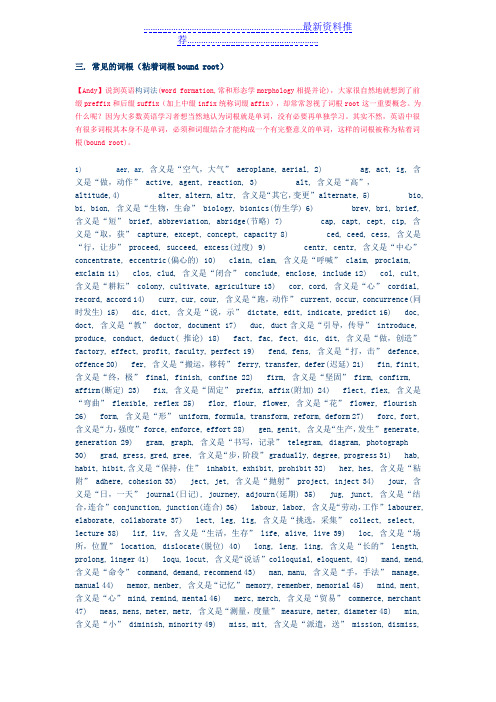
三. 常见的词根(粘着词根bound root)【Andy】说到英语构词法(word formation,常和形态学morphology相提并论),大家很自然地就想到了前缀preffix和后缀suffix(加上中缀infix统称词缀affix),却常常忽视了词根root这一重要概念。
为什么呢?因为大多数英语学习者想当然地认为词根就是单词,没有必要再单独学习。
其实不然,英语中很有很多词根其本身不是单词,必须和词缀结合才能构成一个有完整意义的单词,这样的词根被称为粘着词根(bound root)。
1) aer, ar, 含义是“空气,大气” aeroplane, aerial, 2) ag, act, ig, 含义是“做,动作” active, agent, reaction, 3) alt, 含义是“高”,altitude,4) alter, altern, altr, 含义是“其它,变更” alternate, 5) bio, bi, bion, 含义是“生物,生命” biology, bionics(仿生学) 6) brev, bri, brief, 含义是“短” brief, abbreviation, abridge(节略) 7) cap, capt, cept, cip, 含义是“取,获” capture, except, concept, capacity 8) ced, ceed, cess, 含义是“行,让步” proceed, succeed, excess(过度) 9) centr, centr, 含义是“中心”concentrate, eccentric(偏心的) 10) clain, clam, 含义是“呼喊” claim, proclaim, exclaim 11) clos, clud, 含义是“闭合” conclude, enclose, include 12) col, cult, 含义是“耕耘” colony, cultivate, agriculture 13) cor, cord, 含义是“心” cordial, record, accord 14) curr, cur, cour, 含义是“跑,动作” current, occur, concurrence(同时发生) 15) dic, dict, 含义是“说,示” dictate, edit, indicate, predict 16) doc, doct, 含义是“教” doctor, document 17) duc, duct含义是“引导,传导” introduce, produce, conduct, deduct( 推论) 18) fact, fac, fect, dic, dit, 含义是“做,创造”factory, effect, profit, faculty, perfect 19) fend, fens, 含义是“打,击” defence, offence 20) fer, 含义是“搬运,移转” ferry, transfer, defer(迟延) 21) fin, finit, 含义是“终,极” final, finish, confine 22) firm, 含义是“坚固” firm, confirm, affirm(断定) 23) fix, 含义是“固定” prefix, affix(附加) 24) flect, flex, 含义是“弯曲” flexible, reflex 25) flor, flour, flower, 含义是“花” flower, flourish 26) form, 含义是“形” uniform, formula, transform, reform, deform 27) forc, fort, 含义是“力,强度” force, enforce, effort 28) gen, genit, 含义是“生产,发生” generate, generation 29) gram, graph, 含义是“书写,记录” telegram, diagram, photograph 30) grad, gress, gred, gree, 含义是“步,阶段” gradually, degree, progress 31) hab, habit, hibit,含义是“保持,住” inhabit, exhibit, prohibit 32) her, hes, 含义是“粘附” adhere, cohesion 33) ject, jet, 含义是“抛射” project, inject 34) jour, 含义是“日,一天” journal(日记), journey, adjourn(延期) 35) jug, junct, 含义是“结合,连合” conjunction, junction(连合) 36) labour, labor, 含义是“劳动,工作” labourer, elaborate, collaborate 37) lect, leg, lig, 含义是“挑选,采集” collect, select, lecture 38) lif, liv, 含义是“生活,生存” life, alive, live 39) loc, 含义是“场所,位置” location, dislocate(脱位) 40) long, leng, ling, 含义是“长的” length, prolong, linger 41) loqu, locut, 含义是“说话” colloquial, eloquent, 42) mand, mend, 含义是“命令” command, demand, recommend 43) man, manu, 含义是“手,手法” manage, manual 44) memor, menber, 含义是“记忆” memory, remember, memorial 45) mind, ment, 含义是“心” mind, remind, mental 46) merc, merch, 含义是“贸易” commerce, merchant 47) meas, mens, meter, metr, 含义是“测量,度量” measure, meter, diameter 48) min, 含义是“小” diminish, minority 49) miss, mit, 含义是“派遣,送” mission, dismiss,transmit, missile 50) mob, mot, mov, 含义是“动” movement, motion, mobile, remove 51) nect, nex, 含义是“捆扎” connect, disconnect, annex(合并) 52) not, 含义是“记号,注意” note, denote, annotation(注释) 53) onom, onym, 含义是“名字” synonym, antonym, anonymous 54) pair, par, 含义是“a)相同,对等b)准备” compare, prepare 55) pel, puls, 含义是“追逐” expel, impel(推进) 56) pend, pens, pond, 含义是“悬挂” depend, independent, expense(支付) 57) phon, 含义是“声音” symphony, telephone, microphone 58) plac, 含义是“位置,场所” place, replace 59) peopl, popul, publ, 含义是“人民,民众” public, republic, popular, people 60) port, 含义是“搬运” export, import, deport(输送) 61) press, 含义是“压,压制” pressure, express, oppress, impression 62) prob, proof, prov, 含义是“实验,验证” prove, approve, 63) quer, quest, quir, quis, 含义是“寻找,探问” inquiry, question, inquisition(调查,追究) 64) rang, rank, 含义是“排列” arrange, rank, 65) rect, right, rig, 含义是“正,直” correct, direct, erect 66) riv, 含义是“河流,流远”,river, arrive, derive 67) rupt, 含义是“破坏,毁坏” eruption, bankrupt, corruption 68) sci, 含义是“认识,知识” science, conscious 69) scrib, script, 含义是“书写,记录” describe, script 70) sens, sent, 含义是“感觉,情感” sensation, sentiment 71) sign, 含义是“标记,符号” signal, signature, design 72) sembl, simil, 含义是“相似,类似” similar, resemble, assimilate(同化) 73) soci, 含义是“结合,社交” social, association74) spec, spect, spitc, spis, 含义是“看,视” inspect, spectator, conspicuous, respect75) struct, 含义是“建筑,构造” structure, construct, instruct, destruction76) tect, teg, 含义是“遮蔽,掩盖” detect, protect 77) temp, tens, 含义是“时间,时机” tense, contemporary, temporal 78) tend, tes, tent, 含义是“倾向, 伸张”tendency, intension, extend, intend 79) test, 含义是“证明,证实” testify, protest, contest(争论) 80) text, 含义是“编织,构成” textile, texture, context 81) tract, trail, 含义是“拖拉,吸引” attract, tractor, abstract, contract(收缩) 82) tribut, 含义是“给予” contribution, distribute 83) us, ut, 含义是“用,使用” usable, utilize, abuse 84) vac, van, 含义是“空,虚” vacancy, vanity, evacuate(清空) 85) vad, vas, wad, 含义是“走,去” invade, wade, evade(逃避) 86) vers, vert, 含义是“旋转,反转”convert, inversion(倒转), reverse, divert(使转向) 87) vid, vis, vey, view, 含义是“观看,看见” television, visible, evident, interview, survey 88) viv, vit, 含义是“生,活” vivid, vital, survival, 89) war, ward, 含义是“注意,保护” aware, wary(谨慎), ward(守护) 90) way, 含义是“路” way, away, subway, always。
- 1、下载文档前请自行甄别文档内容的完整性,平台不提供额外的编辑、内容补充、找答案等附加服务。
- 2、"仅部分预览"的文档,不可在线预览部分如存在完整性等问题,可反馈申请退款(可完整预览的文档不适用该条件!)。
- 3、如文档侵犯您的权益,请联系客服反馈,我们会尽快为您处理(人工客服工作时间:9:00-18:30)。
Bound root. As illustrated by the example antecedent, a bound root is that part of the word that carries the fundamental meaning just like a free root.Unlike a free root, it is a bound form and has to combine with other morphemes to make words. Take-dict- for example. It is a Latin root which conveys the meaning of ‘say or speak’, but it is not a word in its own right. Yet with affixes, it can form quite a number of words. For example, with the prefixes contra - ( against) and pre - ( before) we obtain the verbs contradict meaning ‘speak against’ and predict meaning ‘tell beforehand’; with the suffix -ion, we form contradiction and prediction; with the suffix -or, we have contradictor and predictor. Apart from these, dictum, dictate, dictation, dictator, diction, dictionary are all derived from the root -dict-.In English, bound roots are either Latin or Greek. Although they are limited in number, their productive power is amazing. They give birth to thousands and thousands of derived words in modern English.Latin roots:according to their alphabetical order.1)acu- (acr-)----- sharp.Acute----- working very well, sharp.Dogs have an acute sense of smell.2) ag- (act-)----- to do, to drive.agent—a person who does something.3) am-----to love.Amateur---- a person who does something for the love of it rather than for money.4) a nim------------life or mind.animal a living creature.5) annu- (ennu-) —year.annual—of one year.6) aud- (audit)------ to hear.audience—the people listening to or watching a performance, speech,television, show, etc.7) bene- (benign-) well, good.benefit ----------good effect.8) cad- (cid-cas-) —to fall, to happen by chance.Accident------something that happens by chance.9) cap- (capt-) —--to take.capture-------- something that has been taken, caught or won by force.10) c ed- (cede-)---- to go.antecedent ------a thing, event, etc. coming or being beforeanother.11)cent------------ one hundred.century ------a period of 100 years.12) c ern- (cret-)------ to separate.secret—something separated or apart from others, something kept hidden or known only to a few.13) c lam- (claim-) to cry out.declaim—to say something loud and clear, with pauses and usually hand movements to Increase the effect of the words.14) d ud- (clus) —to shut, to close.conclude to come to an end.15) cord—heart.Cordial----- warm and hearty.16)corpor-. (corp-)------- body.Corpuscle----- any of the red or white cells in the blood.17) c re- (cresc-) —to grow.Increase------- to become larger in amount or number.18) c red-------to believe.Discredit------ to stop people believing.19) c umb- (cub--) to lie down.Cubicle-------- a very small enclosed room division of a larger room, as for dressing or undressing at a swimming pool.20) c ur- (curs-, cours-) ---to run or to go.current -------a continuously moving mass of liquid or gas, especiallyone flowing through slower-moving liquid or gas.21)de- (div-)------- a god.divine—of, related to, or being God or a god.22)dict----- to say or to speak.dictate--------to say (words) for someone else to write down.23)doc- (doct-)------- to teach.doctor—It originally meant ‘a teacher’ , now it means ‘a personholding one of the highest degrees given by a university (such as a PhD,)24)duc- (duct-) —to lead.i ntroduce----- to make known for the first time to each other orsomeone else, especially by telling two people each other’s names. 25)fac- (fic- fact-)----------- to do or to make.Manufacture---- to make or produce by machinery, especially in large quantities.26) fer------- to carry, to bring.c onfer —to give (a gift, title, honor, favor ,etc. ).27) firm-—firm, strong.Confirm---- to support, make certain, give proof of.28) flect- (flex-) -------to bend.Flexible------ that can bend or be bent easily.29)flu- (flux-)-------- a flow or to flow.Fluent------ speaking, writing, playing a musical instrument in an easily smooth manner.30)fus- (fund-)--------- to pour, to melt.confuse—to mix up, to make less clear.31)gam-------- marriage.bigamy ----the state of being married to two people at the same time.32) g en- (genit-)------ to produce, to give birth to.genesis—-the beginning or origin.33)ger- (gest-)------- to carry.digest—---to change or to be changed into a form that the body can uses34)grad- (gress-)------ a step or to step or go.Gradual---- happening slowly and by degrees; not sudden.35)grat----------- pleasing.Congratulate------ to speak to a person with praise and admiration for a happy event or something successfully.36) gray-—heavy.gravity ------attractive force by which bodies tend to go to the center of earth, etc.37)her- (hes-)------- to stick.adhere.--------to stick firmly (to another or each other. )38) j ac- (ject-) —to throw.project -----to cause (heat, sound, light, or shadow) to be directedinto space or onto a surface.39)junct- (join (t) -)----------- t o join.conjunction ------the act or result of joining together, association. 40)lect- (leg-, lig-)------- to choose.collect----- (to cause) to gather together.41)loqu- (lacut-)-------- t o speak.Colloquial------ suitable for, related to ordinary informal, or familiar conversation.42) mit- (miss-) —to send, to let go.Admit----- to permit (a person or thing) to enter.Missile--- a) an object or a weapon thrown by hand or shot from a gun or other instruments. b) an explosive weapon which can fly under its own power.43) m on- (monit-) —to warn, to advise.Monitor---- a pupil chosen to help the teacher in various ways.44) n asc- (nat-) —to be born.Nation------ the place of one’s birth ,a large group of peo ple living inone area and usually having an independent government.45) p el- (pell-) —to drive.compel -------to make (a person or thing) do something by or as if by force.46) p end- (pens-) —to hang.depend ----to rely on.47) p et- (petit-) —to seek, to strive.Competition----- a test of strength, skill, ability, etc.48) plex- (plic-, plicit—) —to twist, to connect. complex consisting ofmany closely related or connected parts.49) p ound- (pond- pose, posit-) ——to put.compound -----consisting of two or more separate parts, substances , etc.compose --------to make or form (something) by putting parts together.50) port-—to carry.Export---- to send (goods) out of a country for a sale.51) quir- (quisit-) —to seek or ask.inquire—to ask.52) r upt------to break or to burst.interrupt ----to break the flow of (something continuous).53)scrib- (script-)------- to write.describe——- to give a picture (of someone or something) in words.54)sed- (sid-)------- to sit or to settle.preside -----to be in charge of, to lead.55) s pect- (spec-, spic-) —to look, to look at.inspect ------to examine (the details of something).56) t act- (tang-, ting-)----- to touch.Contact--- to get in touch with (someone).57)ten- (tin-, tam-)--------to hold.Continent---main unbroken masses of land on the earth.58) t ract------ to drag or to pull.contract -----a formal agreement, having the force of law.59)ven- (vent-)------ to move toward, to come.event ----a happening, usually an important one.60)vert- (vers-)------- to turn.reverse— to turn something, over, so as to show the back.61) v id- (vis-) ——--to see.Vision---- the ability to see.62)voc- (vok-)-------- voice or to call.Provoke----- to make (a person or animal) angry or bad tempered.63) volv (volut-) —to roll.Revolve----- to spin round (on a central point).Greek roots:1) anthrop-(anthropo-)--------- man or human.Anthropology----- the science of man or the scientific study of thenature of man, including the development of his body, mind andsociety.2) archeo- (archi-)------- ancient.archeology—the study of the buried remains of ancient times, suchas houses, pots, tools and weapons.3) aut- (auto-) ----self.Automatic----- able to work or move by itself withoutneeding the operation of men. -Questions and Tasks1. Write the terms in the blanks according to the definitions:a. a minimal meaningful unit of a language ( )b. one of the variants that realize a morpheme ( )c. a morpheme that occurs with at least one other morpheme ( )d. a morpheme that can stand alone ( )e. a morpheme attached to a stem or root ( )f.an affix that indicates grammatical relationships ( )g. an affix that forms new words with a stem or root ( )h.what remains of a word after the removal of all affixes ( )i. a form to which affixes of any kind can be added ( )2.Write out the common bound roots of the words in each of the followinggroups and state their meanings.1) acoustic, acoustical, acoumeter, acoustician, acoustics, acouphone: _acou- (to hear)_______2) amateur, amatory, amiable, amicable, amorous, enamoured,unamiable: _ am-, amor- (love)________3) ample, ampleness, amply, amplidyne, amplification, amplifier,amplify, amplitude, radioamplifier: ampi- (enough)4) annals , annual , perennial , centennial, annuity, biennial: ann- (year)5) archangel, archbishop, arch-criminal ,archdeacon,archdiocese, archenemy, archfiend: __5) arch- (chief, leader)_______6) biology, biogenesis, biogenic, biogeography, biography, bionics,bioscope, biotic, biomass: ___ bio- (life)______________7) audible, audibility, inaudible, audience, audiology,audiovisual ,audiometer, audiophile, audition, auditor, auditorium: _ aud- (to hear)_______8) autoalarm, autobiographer, autoboat , autobus, autochrome, autoclave,autocrat, autograph, autoinfection, automate, automatic, automation, automobile, autonomy, autotrunk, autotype: _ auto- (self)_______ 9) Bible, bibliofilm, bibliography, bibliology, bibliolater,bibliomania, bibliophile, bibliophilism, billiotheca, bibliotic, bibliotist: ___ biblio- (book)______10) breve, breviary, brevirostrate, brevity, brief, abbrevi-ate, abridges _bre- (brief)。
